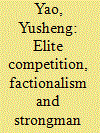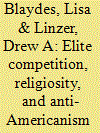|
|
|
Sort Order |
|
|
|
Items / Page
|
|
|
|
|
|
|
| Srl | Item |
| 1 |
ID:
159503


|
|
|
|
|
| Summary/Abstract |
International wars and interstate rivalry have been at the center of our understanding of the origin and expansion of state capacity. This article describes an alternative path to the development of state capacity rooted in domestic political conflict. Under conditions of intra-elite conflict, political rulers seize upon the temporary weakness of their rivals, expropriate their assets, and consolidate authority. Because this political consolidation increases rulers’ chances of surviving an economic elite’s challenge, it enhances their incentives to develop state capacity. These ideas are evaluated in post-revolutionary Mexico, where commodity price shocks induced by the Great Depression affected the local economic elite differentially. Negative shocks lead to increased asset expropriation and substantially higher investments in state capacity, which persist to the present.
|
|
|
|
|
|
|
|
|
|
|
|
|
|
|
|
| 2 |
ID:
156262


|
|
|
|
|
| Summary/Abstract |
This study examines the elite political competition in a large agrarian village in Hubei Province. Although known locally as well-governed, this village was actually a bifurcated political community with a host of problems. The power struggle between a few members of the village’s political elite in the past two decades focused on the office of village Party secretary and produced a polarized politics of factionalism. The town Party committee played a crucial role in selecting the village’s Party secretary for economic development with dubious results. This study also examines how and why a strongman Party secretary could hold on to power for 16 years despite an increasing opposition. It reveals the governing dilemma for a village that was hard to govern and the unintended consequences of the Party’s recruitment policy for village leaders. Through the elite competition for the past two decades this study aims to capture a total picture of the village politics including its political ecology, agency and dynamics.
|
|
|
|
|
|
|
|
|
|
|
|
|
|
|
|
| 3 |
ID:
113551


|
|
|
|
|
| Publication |
2012.
|
| Summary/Abstract |
The battle for public opinion in the Islamic world is an ongoing priority for U.S. diplomacy. The current debate over why many Muslims hold anti-American views revolves around whether they dislike fundamental aspects of American culture and government, or what Americans do in international affairs. We argue, instead, that Muslim anti-Americanism is predominantly a domestic, elite-led phenomenon that intensifies when there is greater competition between Islamist and secular-nationalist political factions within a country. Although more observant Muslims tend to be more anti-American, paradoxically the most anti-American countries are those in which Muslim populations are less religious overall, and thus more divided on the religious-secular issue dimension. We provide case study evidence consistent with this explanation, as well as a multilevel statistical analysis of public opinion data from nearly 13,000 Muslim respondents in 21 countries.
|
|
|
|
|
|
|
|
|
|
|
|
|
|
|
|
| 4 |
ID:
176510


|
|
|
|
|
| Summary/Abstract |
Election violence varies significantly within countries, yet how and why are undertheorized. Although existing scholarship has shown how national-level economic, institutional, and contextual factors increase a country's risk for violence during elections, these studies cannot explain why elites organize election violence in some localities but not others. An analysis of gubernatorial elections in Nigeria reveals the conditions under which elites recruit popular social-movement actors for pre-election violence. Gubernatorial elections are intensely competitive when agreements between governors and local ruling party elites over the distribution of state patronage break down. To oust their rivals and consolidate power, elites recruit popular reformist groups for pre-election violence and voter mobilization. Conversely, when local ruling-party elites are aligned over how state patronage is to be distributed, the election outcome is agreed to well in advance. In this scenario, there is little incentive to enlist social movement actors for violence. Case studies of the Ijaw Youth Council and Boko Haram provide empirical support for the argument. The theory and evidence help explain subnational variation in election violence as well as the relationship between intraparty politics and violence during elections, and speak to broader questions about political order and violence.
|
|
|
|
|
|
|
|
|
|
|
|
|
|
|
|
|
|
|
|
|